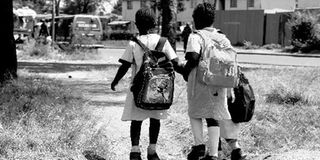The future Kenya's children deserve

School pupils walk home from school in Jericho, in Nairobi, July 17th, 2013.
What you need to know:
- At the clinics and health centres where we see sick children, babies are shuddering and gasping for breath from sicknesses like pneumonia and infants and toddlers arrive desperately dehydrated from diarrhoea.
This means that one in four of the children who die in Kenya before reaching their fifth birthday die as a result of these two preventable and treatable diseases.
Stopping these deaths must be a priority.
At the clinics and health centres where we see sick children, babies are shuddering and gasping for breath from sicknesses like pneumonia and infants and toddlers arrive desperately dehydrated from diarrhoea.
These are the children lucky enough to reach the care centres and receive the care they need, and we do our best to help them heal.
But too many other children never live to get the care they need.
The World Health Organization’s (WHO) 2013 report on World Health Statistics shows just what we are up against.
More than 100,000 of Kenya’s children die each year before they reach their fifth birthdays.
Far too many of these children die from preventable and treatable causes like pneumonia and diarrhoea.
These diseases are not signs that a child is sickly or has been cursed and they certainly shouldn’t be considered a normal part of growing up—yet they are the top killers of our children.
According to UNICEF (2013) pneumonia and diarrhoea cause approximately 25 per cent of deaths of children aged less than five years.
This means that one in four of the children who die in Kenya before reaching their fifth birthday die as a result of these two preventable and treatable diseases.
Stopping these deaths must be a priority.
By taking on these two diseases together, we can make the single greatest impact on improving the survival of Kenya’s children and improving our country’s future.
Unlike many other threats to child health, we already know what works to protect children from pneumonia and diarrhoea: improving home air quality, nutrition, personal hygiene, access to vaccines and safe water and sanitation.
When children do become sick, they can be treated with oral rehydration therapy using ORS and zinc for diarrhoea, and amoxicillin and oxygen for pneumonia.
We have the tools today to protect children from pneumonia and diarrhoea.
These tools are a critical part of basic health care and it is up to our leaders to understand and prioritize them.
Thousands of lives can be saved by ensuring our children have access to the solutions they need and by fighting pneumonia and diarrhoea together through a coordinated approach, like the approach outlined in the WHO and UNICEF’s 2013 Global Action Plan for the Prevention and Control of Pneumonia and Diarrhoea.
There is reason for optimism. We have made progress in recent years.
By enacting the 2010 Diarrhoeal Disease Control Policy, Kenya has been a leader in the fight against diarrhoea.
According to the WHO, nearly three-quarters of Kenyan children who experience diarrhoea episode are receiving effective treatment—oral rehydration therapy.
There is also some good news in the fight against pneumonia.
Roughly 50% of the children with acute respiratory infections are given antibiotics and/or taken to a health care facility early, and there is room for improvement.
Only 32 per cent of babies are exclusively breastfed during the first six months of life—which is scientifically proven to protect children against both pneumonia and diarrhoea.
More than 35 per cent of children are stunted as a result of diarrhoea and poor nutrition.
We can certainly do better.
November 12 was World Pneumonia Day. World Toilet Day follows on November 19.
We ask you to join the fight and protect our future by protecting our children.
This cannot just be a government effort.
We must each take responsibility for the health of our children and we must all work together: families, communities, health care providers and the government.
It is only by aggressively taking on threats to child health, like pneumonia and diarrhoea, and by making sure that every child has access to the care they need, that we can ensure a healthy future for all of our children.
Good health after all is the underpinning for healthy citizens, communities, countries and ultimately a better, more prosperous Kenya.
Professor Fred Were is apaediatrician and specialist in neonatal medicine.
He is also president of the Eastern African Paediatric Association and Kenyan Paediatric Association.
Alfred Ochola is the Primary Health Care Coordinator and Technical Advisor for Child Survival and Development for PATH in Kenya.
To learn more about the Global Action Plan for the Prevention and Control of Pneumonia and Diarrhoea, please visit:http://www.defeatdd.org/global-action-plan.




